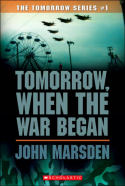 Book description:
Book description:
When Ellie and her friends go camping, they have no idea they’re leaving their old lives behind forever. Despite a less-than-tragic food shortage and a secret crush or two, everything goes as planned. But a week later, they return home to find their houses empty and their pets starving. Something has gone wrong—horribly wrong. Before long, they realize the country has been invaded, and the entire town has been captured—including their families and all their friends.
Ellie and the other survivors face an impossible decision: they can flee for the mountains or surrender. Or they can fight.
Review:
It’s been several weeks now since I finished Tomorrow, When the War Began. Normally, I write a book’s review as soon as I finish reading it, but I feel like I’m still processing this one to some extent, trying to figure out exactly how I feel about it.
This is due in part to the fact that I have greatly enjoyed the other books by John Marsden that I have read, and so built this series up in my mind as something that was going to be jaw-droppingly amazing. And when it turned out not to be so, even though it’s still quite good in general and genuinely riveting in parts, I was kind of disappointed.
This is the story of seven Australian teenagers (later eight) living in the rural town of Wirrawee who go camping while their parents and most of the people in town are attending a fair. The kids return to find that a mysterious military force has invaded Australia and has imprisoned most of the townspeople at the fairgrounds, including their families. They must decide what, if anything, they’re going to do to help. Ellie Linton has been tasked with chronicling their story.
Large portions of the tale are pretty fascinating. The teens are resourceful and rise to the occasion, especially Ellie’s clown/daredevil childhood friend, Homer, who emerges as the group’s leader, and Fiona, a ladylike rich girl who proves to have unexpected reserves of courage. While Homer is the tactician of the group, Ellie seems to find herself trusted with the most dangerous missions, which require some quick, inventive thinking on her part in difficult situations involving things like exploding lawn mowers, demolition derby bulldozers, and exploding gas tankers.
I even liked the parts of the story where the characters talk about what they’re going to do—are we going to hide out here in our camping spot, or are we going to try to engage the enemy somehow?—and the various supplies they’re going to need from town, whether to keep chickens, etc. Where the story really bogs down, however, is with the introduction of romance.
Ellie has never considered Homer in a romantic way before, but begins to see him in a new light given his metamorphosis. Meanwhile, she’s also intrigued by Lee, the inscrutable Asian musician, and Homer has fallen for Fiona. Ellie dwells a lot on her confusion before ultimately deciding upon Lee, and then telling readers about all the making out they’re doing and how she has learned the things that make him groan, etc. I kept thinking how embarrassing all of this will be for Lee whenever he/anyone reads this official chronicle!
Anyway, it’s not that I am anti-romance or anything, but it’s just that these scenes really slow down the pace of the story. And maybe that is the point. Even if something as dramatic as an invasion has occurred, there will still be a lot of downtime if you’re hiding out in the woods, and a lot of time for more mundane things to be going on.
I guess what it boils down to is that my perception of the book has been hampered by my expectations. I am certainly going to read the rest of the series, and hopefully I will like it better now that I’ve reconciled myself to what it actually is rather than what I thought it was.
Additional reviews of Tomorrow, When the War Began can be found at Triple Take.








Recent Comments